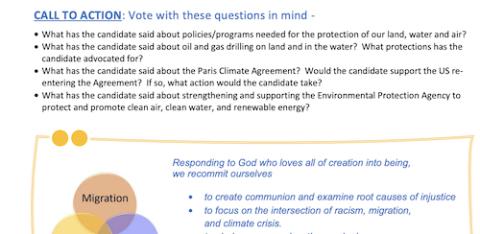During the spring of 2019, sisters, associates and friends gathered peacefully each week for nearly two months as a compassionate response to the grief and fear wrought by racially motivated murders and violence in cities across the United States. Here, they walked from the front yard of the motherhouse of the Dominican Sisters-Grand Rapids in Michigan. (Dominican Sisters-Grand Rapids, Michigan)
The Reflective Voting Guide that 11 congregational justice and peace promoters created and circulated sought to emphasize one point above all: Discerning whom to vote for is not a one-issue matter.
"We [the church] as an institution have not done good, educational evangelization on Catholic social teaching," said Dominican Sr. Brigid Clingman, the promoter of justice for her community in Grand Rapids, Michigan.
Multiple life issues — such as the environment, immigration, health care or racism — have not been held in the same regard as abortion, she added, and instead have been considered leftist priorities rather than "Gospel values. One of the hopes of our work here is that we can bridge some of those disconnects and raise some perhaps uncomfortable questions that say issues do not stand alone; issues are the web of life and integral ecology, and we have to as citizens be aware of that."
The voting guide (hosted online by Franciscan Action Network) aims to do just that, as sisters in Indiana and Michigan — also known as Region 7 of the Leadership Conference of Women Religious — developed a document to help voters in the United States discern which political candidates best align with Catholic values.
The document was also one way that Region 7 chose to put into action LCWR's resolution for 2019-2022, which calls for "creating communion at the intersection of climate change, migration and racism." Congregations such as the Dominican Sisters of Grand Rapids had frequently held public vigils and protests to bring attention to such issues, before the coronavirus prevented such gatherings. The voting guide is an extension of their actions.

From "A Reflective Voting Guide" (GSR screenshot)
Broken down into three modules, the voting guide offers anecdotes related to each particular issue to illustrate its lived experience. It also includes excerpts and resources that demonstrate how that issue is valued within the framework of Catholic social teaching, and calls for action that prompt one to consider candidates' positions on that subject.
Through the story of Ruben, a young Salvadoran farmer forced to flee his country, for example, the abstract issue of migration (and its relation to climate change) is given a face and tangible stakes. When a 2014 drought decimated his crops, he only had enough money for him and his daughter to journey to the U.S. so that he could keep his daughter safe while sending money back home to his wife, whom he had to leave behind in El Salvador where violence, gangs and political instability had taken over the region.
Listing a number of Gospel values, the voting guide provides a lens through which Catholic voters should consider Ruben's experiences: life and dignity of human persons, fundamental option for the poor and vulnerable, solidarity, the dignity of work and the rights of workers, and care for God's creation.
Advertisement
The series of questions that concludes the section on migration prompts the reader to evaluate the candidates' political positions and promises with regard to this issue, such as, "Does the candidate support diplomacy and peacebuilding efforts in war-torn countries to address the root causes of forced migration, including gang violence and drought? Does s/he support multinational efforts to help migrants and refugees?"
How congregations choose to utilize the guide is up to them. Some within Region 7 circulated the document within their various networks (including sister associates, grassroots organizations, or local Nuns and Nones chapters) with the hopes that they'd "take reflective time to discern our obligation as voters" — perhaps in small group discussions — and that in that process, they analyze "how issues intersect with each other, that no one issue has a priority over all the others because they all connect," Clingman said.
"We enter into the voting process with the reality that we are responsible for the common good of all people and that there is no perfect candidate."
The weight of responsibility, she said, should feel distributed throughout all the life issues at stake, "and we need to think that way."
"We're getting more and more documentation from bishops and Vatican on the fact that this is a responsible process," she said. "We do have individual persons and episcopal [leaders] who are saying no, that it's one issue and everyone else should be condemned, but those loud voices are not a majority."
[Soli Salgado is a staff writer for Global Sisters Report. Follow her on Twitter: @soli_salgado. Her email address is [email protected].]





